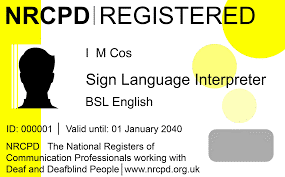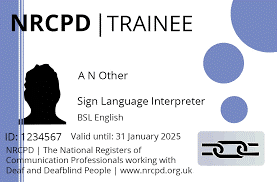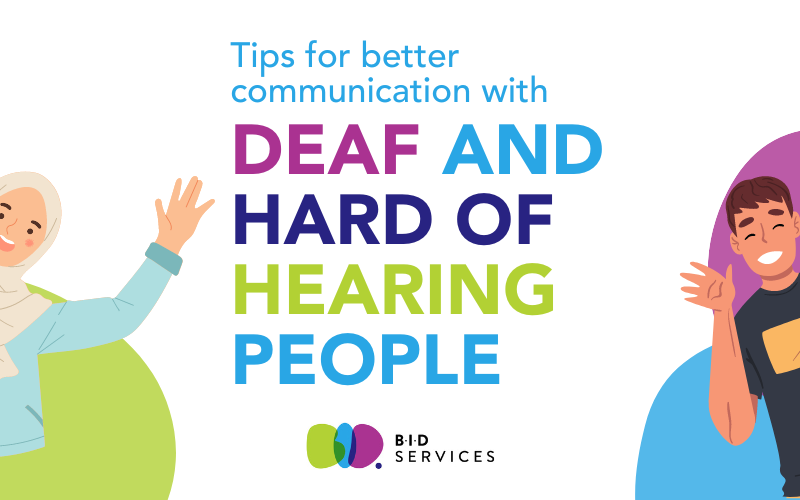Different Terminology for a BSL Interpreter
When working with or booking a British Sign Language (BSL) interpreter for the first time, you may encounter different terms used to describe their role and the services they provide. To avoid it completely flying over your head, here’s a guide to the key terminology:
BSL Interpreter
A BSL interpreter is a trained professional who facilitates communication between Deaf BSL users and hearing individuals. They interpret spoken English into BSL and vice versa.
Registered Sign Language Interpreter (RSLI)
An RSLI is a fully qualified BSL interpreter who is registered with a recognised professional body such as the National Registers of Communication Professionals working with Deaf and Deafblind People (NRCPD). They have met the required standards of training and professional development. They will usually have a yellow badge confirming their identity and registration with NRCPD.

Trainee Sign Language Interpreter (TSLI)
A TSLI is in the process of completing their training to become fully qualified. They have some interpreting skills but may have limitations in the settings they can work in. They will always have a NRCPD Trainee identity badge which is normally purple.

Deaf Relay Interpreter
A Relay Interpreter is usually a Deaf professional who interprets between BSL and another form of signed communication, such as International Sign or a modified version of BSL suited to an individual’s needs.
Deaf Interpreter (DI)
A Deaf Interpreter is a Deaf professional who works alongside a BSL interpreter to support communication in complex situations, such as for individuals with minimal language skills or additional communication needs.
Lipspeaker
A Lipspeaker supports communication by repeating spoken words clearly for Deaf individuals who lipread.
Communication Support Worker (CSW)
A CSW assists Deaf individuals in educational and workplace settings by providing some level of communication support. However, they are not fully qualified BSL interpreters and should not be used as a substitute for an RSLI.
Speech-to-Text Reporter (STTR)
An STTR provides live captions for Deaf and hard-of-hearing individuals by converting spoken English into real-time text.
Common Misconceptions and Incorrect Terminology
People who are unfamiliar with BSL interpreters or other communication support options available may use incorrect terms to describe them. Here are some common misconceptions:
- “Signer” – Some people mistakenly believe that anyone who knows BSL can act as an interpreter. However, a professional interpreter has extensive training to accurately translate between English and BSL. It is not recommended to use friends or family and in many settings you are entitled to an interpreter, e.g. GP appointment.
- “Translator” – While similar, a translator works with written languages, whereas an interpreter works with spoken and signed languages in real-time.
- “Just helping” – Some assume that BSL interpreters are simply assisting rather than performing a skilled, professional role that requires certification and training.
Why the Right Interpreter Matters
Using the correct level of BSL interpreter ensures effective and accurate communication. A fully qualified RSLI is recommended for formal settings such as medical appointments and legal matters.


